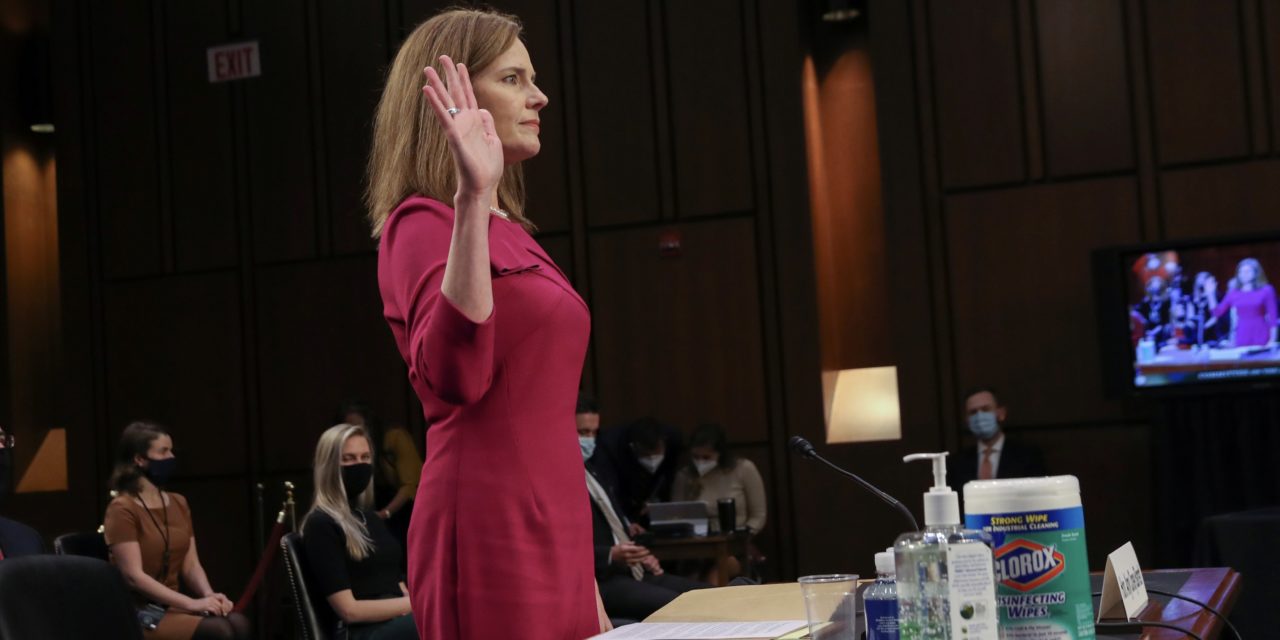The first day of the Supreme Court confirmation hearings on the nomination of Judge Amy Coney Barrett featured opening statements from 22 members of the Senate Judiciary Committee, followed by the opening statement of the nominee.
Prior to Judge Barrett’s opening statement, she sat patiently through several hours of opening statements by committee members. For their part, Democrats, beginning with ranking member Dianne Feinstein, D-Calif., used their opening statements to frame the hearings as a referendum on Obamacare. Other Democrats who followed her, including Sen. Patrick Leahy, D-Vt., and Sen. Richard Durbin, D-Ill., held up pictures of Americans who benefited from Obamacare in one way or the other.
The Supreme Court has scheduled oral arguments on the constitutionality of that law for November 10 in a case from Texas.
Republicans took their opportunities to speak to highlight Barrett’s professional record as well as to educate viewers on the constitutional responsibilities of the judiciary, of the Senate, and of the presidency as they relate to the appointment of federal judges. Senator Ben Sasse, R-Neb., gave what he described as an “8th-grade civics” lesson, in which he explained that civics is “something all Americans should agree on,” no matter their politics. He went on to describe the Constitution’s protection of the freedom of religion, and why inquiring into a nominee’s religious affiliations, implicitly referring to Barrett’s Catholic faith and her membership in the People of Praise faith group, are off limits to the committee.
He then condemned any future attempt by a new Congress to engage in “court-packing,” i.e., expanding the number of justices on the high court in order to allow a new president to add three to five more nominees of their choosing. That would be a “partisan suicide bombing,” Sasse said.
For her part, Judge Barrett spoke warmly about her family.
“As I said when I was nominated to serve as a Justice, I am used to being in a group of nine—my family. Nothing is more important to me, and I am so proud to have them behind me.”
Barrett referred to her mentor and former boss, Justice Antonin Scalia, and how his judicial philosophy became her own.
“I also clerked for Justice Scalia, and like many law students, I felt like I knew the justice before I ever met him, because I had read so many of his colorful, accessible opinions. More than the style of his writing, though, it was the content of Justice Scalia’s reasoning that shaped me. His judicial philosophy was straightforward: A judge must apply the law as written, not as the judge wishes it were. Sometimes that approach meant reaching results that he did not like. But as he put it in one of his best-known opinions, that is what it means to say we have a government of laws, not of men.”
And she pledges to serve the American people well as a justice.
“And if I am fortunate enough to be confirmed, I pledge to faithfully and impartially discharge my duties to the American people as an Associate Justice of the Supreme Court.”
Barrett has received a “Well Qualified” recommendation from the American Bar Association (ABA), its highest rating.
The confirmation hearings are scheduled to run through Thursday.






